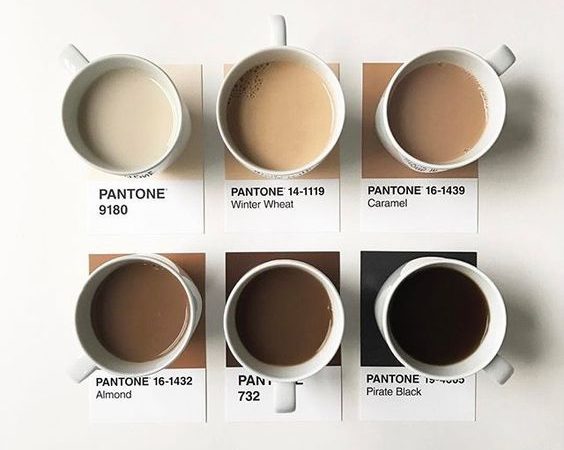Many of us creative types spend a lot of time seeking out “inspiration”. In fact, if you’re like me it’s your job to find and write about art or other things that might spark artistic inspiration in the minds of readers. I’m not here to make light of that either, it’s what I do and I love it. However, the reason I put quotations around the word inspiration above is because many times in the blogging world we say things like, “we are your source for inspiration” or “check out this inspiring post” etc. as if further consumption of this or that will be the deciding factor in whatever you’re working on.
It’s an easy idea to buy into, especially if a particular post has helped you out on a project in the past. But before long you can find yourself bouncing from blog to blog, endlessly clicking through your reader, or staring bleary eyed at twitter, facebook, and tumblr waiting for inspiration to strike. Meanwhile, getting absolutely NOTHING done. And there’s a good reason for that. A blog post is not inspiration. It may contain the spark of inspiration but that spark can only occur because the perfect conditions already exist in your mind. If you think of inspiration as “a sudden understanding” it gets a bit easier to illustrate. If you’re looking at design roundups you will find references, but a “sudden understanding” of how to meet your clients needs with your design is something else entirely. An understanding might be triggered by a reference but not always. Sometimes the mind simply needs time to connect the dots. More work or “inspiration” only get in the way.
Archimedes’ Eureka Moment
 Take the ancient story of Archimedes for example, the scientist who famously coined the term “Eureka!” when he discovered the physical law behind buoyancy. His story goes like this: Hiero II, King of Syracuse, was pretty sure he was getting ripped off by a goldsmith. He thought the goldsmith was carefully replacing pure gold with a gold/silver mix and pocketing the difference. So the King turned to Archimedes for a solution. Without catching this goldsmith in the act, how could Archimedes test whether the goldsmith was giving him impure gold? Archimedes struggled for a long time trying to figure out a solution to this problem but had no success. After a very long period of intense study, thought, and experimentation Archimedes was convinced to take a break and go home. When he went home, he filled a bath. As he soaked in the bath he noticed that an equal weight in water had been displaced in relation to his body and he yelled out, “Eureka!” and ran all the way back to the King, stark naked through streets, to tell him how they could test the goldsmith. They took a coin of gold they knew to be pure and a coin from the goldsmith comparing the buoyancy of each. Sure enough, they did not match up and the goldsmith was quickly executed.
Take the ancient story of Archimedes for example, the scientist who famously coined the term “Eureka!” when he discovered the physical law behind buoyancy. His story goes like this: Hiero II, King of Syracuse, was pretty sure he was getting ripped off by a goldsmith. He thought the goldsmith was carefully replacing pure gold with a gold/silver mix and pocketing the difference. So the King turned to Archimedes for a solution. Without catching this goldsmith in the act, how could Archimedes test whether the goldsmith was giving him impure gold? Archimedes struggled for a long time trying to figure out a solution to this problem but had no success. After a very long period of intense study, thought, and experimentation Archimedes was convinced to take a break and go home. When he went home, he filled a bath. As he soaked in the bath he noticed that an equal weight in water had been displaced in relation to his body and he yelled out, “Eureka!” and ran all the way back to the King, stark naked through streets, to tell him how they could test the goldsmith. They took a coin of gold they knew to be pure and a coin from the goldsmith comparing the buoyancy of each. Sure enough, they did not match up and the goldsmith was quickly executed.
 An unfortunate story for the goldsmith to be sure, but what I want to point out is that the moment of breakthrough inspiration came to Archimedes only after he got a little distance from what he was working on. I imagine him soaking in the bath, wrecked from long exercises of strenuous mental activity. As he moves, he notices the water level change. Then he tries submerging himself deeper, then he stands, then he sits, testing out a thought he’s having. Then, Eureka!
An unfortunate story for the goldsmith to be sure, but what I want to point out is that the moment of breakthrough inspiration came to Archimedes only after he got a little distance from what he was working on. I imagine him soaking in the bath, wrecked from long exercises of strenuous mental activity. As he moves, he notices the water level change. Then he tries submerging himself deeper, then he stands, then he sits, testing out a thought he’s having. Then, Eureka!
Sounds familiar right? Have you ever been riding your bike, off on a run, taking a hike, or taking a shower, and finally…something clicks? Or a brilliant idea or solution pops into your head from seemingly nowhere? This is what happens when we still our mind, give it a break from stimulation, and allow it to sort through the things we’ve consumed.
More Consumption Does Not Equal More Inspiration
When we hop from blog post to blog post for hours on end, we are not becoming “more inspired”. We run the risk of over-stimulation, or “brain exhaustion” for lack of a better term. For instance, would running 100 miles all at once get you in better shape? No, it would cause serious harm to your body. At a certain point you pass the threshold of healthy activity and it becomes hurtful. Likewise we need to allow our brain the space it needs from the stimulating content we consume for it to make the connections it needs to make for true inspiration or “sudden understanding” to take place. All of this isn’t to say that true inspiration only strikes while we’re on a break either. It strikes in many times and places, not just those I’ve mentioned. What I’m getting at though is that it’s probably healthy to establish a habit of alternating mental stimulation with mental rest. I encourage everyone to give it a shot and see how it goes. I’d love to hear your stories!
Balancing Mental Stimulation With Mental Rest
Giving your brain a break doesn’t have to be a total life transformation. There are some really easy things you can do to get started, then figure out what works best for you.
- In the morning, take at least 20 minutes to drink your coffee in silence. No technology whatsoever, just you and your coffee. Let your brain wake up and process whatever it needs to before diving into emails or whatever else.
- Commuter? Turn off your radio and let your mind wander (not too much!) while you go to or from work.
- Exercise. This doesn’t have to be strenuous. It can be a 20 minute walk in the morning, evening, or even on your lunch break.
- While working on something, try to close everything else so as to not tax your brain with distractions while it’s trying to be brilliant.
- Choose one or two times per day to browse your inspiration sources instead of constantly stimulating your brain throughout the day.
- Get a hobby. This can be anything, the important thing is that it needs to be different than your job/art. Try choosing something mostly physical that doesn’t require strenuous thinking. Running, bike riding, fishing, lawn care, hiking, diy projects/crafts, and the like all work.





Good stuff Nathan. I totally agree that you need to unwind, unplug, or disconnect sometimes to allow your mind to recharge. Kudos
Very well written, Nathan! I used to browse countless CSS galleries or hang out on sites like FFFFound or Dribbble, but I found that the best recipe for me to get inspired, is getting outside, talking a walk or shooting some photos. You are absolutely right when you state that blog posts or galleries can only be a spark for inspiration. It takes a lot more to come up with something truly unique.
Thanks nathan. great article.
Yep, countless hours have been wasted trying to find that golden nugget of inspiration whilst bombarding myself with countless sites and finding nothing to work with! Being frustrated is an understatement !
More often than not, ive found an idea away from the screen. Resting your mind and body really does help and even just concentrating for a short burst to digest the info you need can work wonders.
Highly recommended.
Whenever I know I will be working on a new project, a few days before I’m scheduled to work on it, I sit down and read through all the collateral, messaging, emails, etc. Then, I don’t “think” about it until it’s time to get started. I say it gives me time for ideas percolate. That way when I do get started, I usually have several ideas ready to go.
That’s a great workflo tip Jessica! Love it!
Amen.
The other danger I see from all these big “inspiration roundups” is homogeny. Everybody’s pulling their inspiration from a handful of design blogs, and it shows. When something eye-catching pops up in one of these roundups, you start seeing it everywhere pretty soon.
Awesome article. Thanks so much. I really liked this ‘Balancing Mental Stimulation With Mental Rest’ part of article.
Yep, one designer comes out with an original idea and all through the process of “inspiration” it appears everywhere. I think many designers are seeking inspiration in the wrong places. I don’t see anything inspiring by spending hours looking at website galleries and in the end coming out drained. Try seeking inspiration in music, poetry, food…some place else away from your computer.
what you said is absolutely right…
eureka! 🙂
Very nice article Nathan. I like the story of the scientist and helpful advices given here.
Thanks, Madan
Yo Nathan! Great post my friend. Agree with you completely. What works for my creative mind is to take early walks in the morning. Like 5-6o’clock. Mostly because I do my work at night and just take a walk after. I walk through the ricefields at the back of my house where is air is fresh, the breeze is cool, and landscape is breathtaking. It helps when you put yourself in a place that is soothing. I pray there while I walk, bringing my mind away from the world for just a moment. Then suddenly EUREKA!